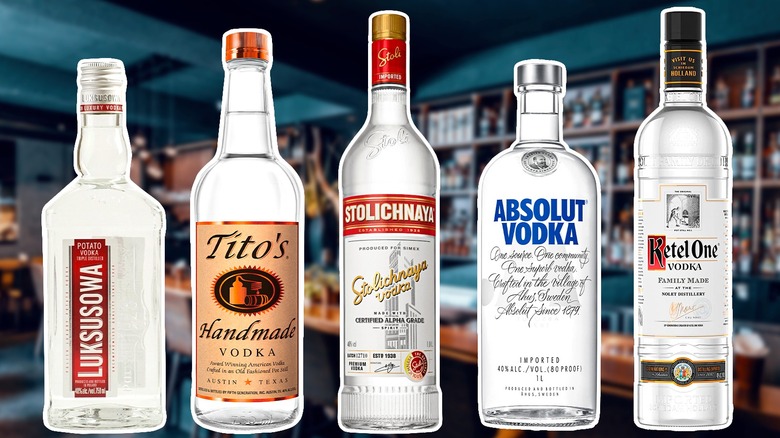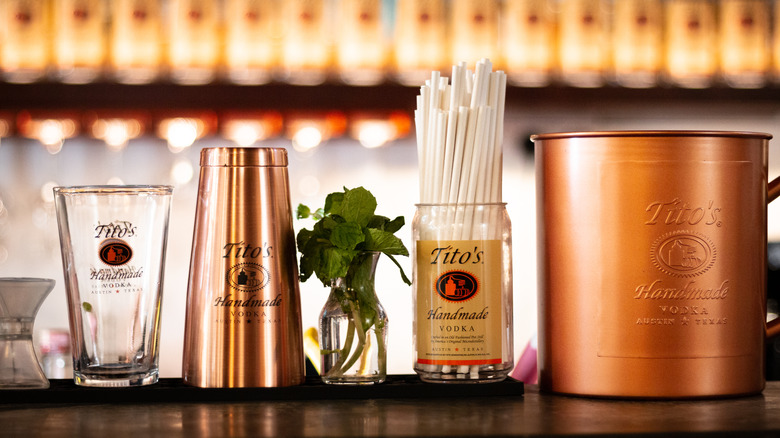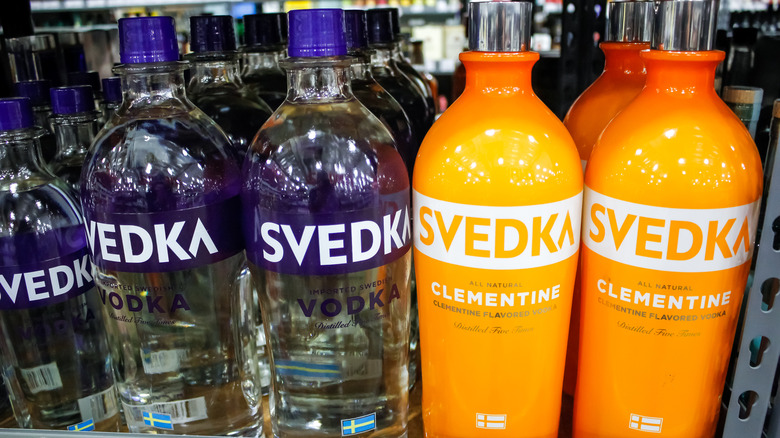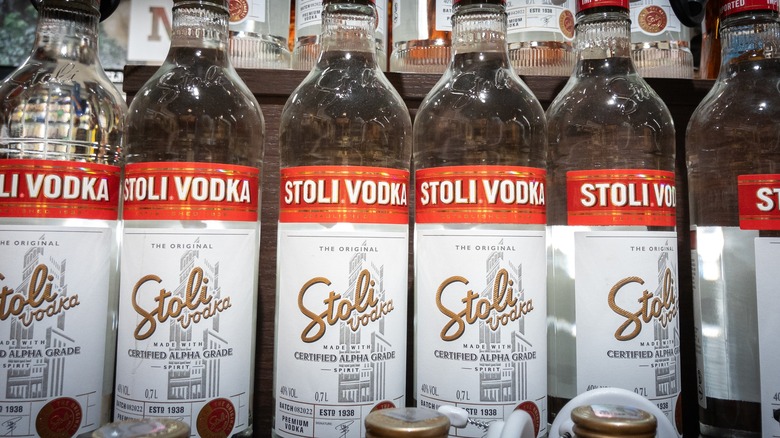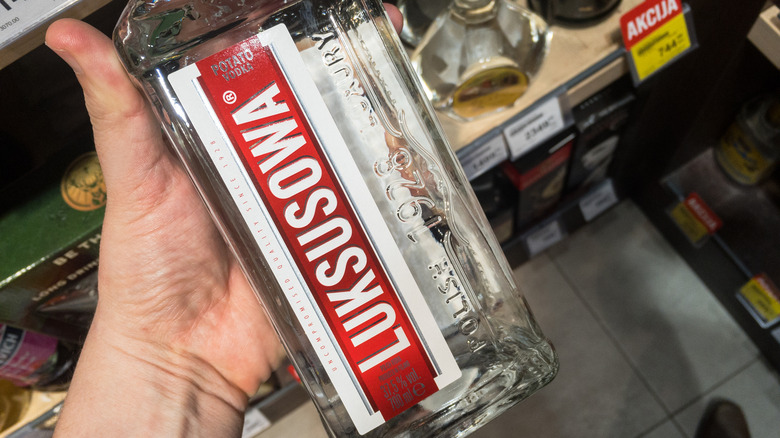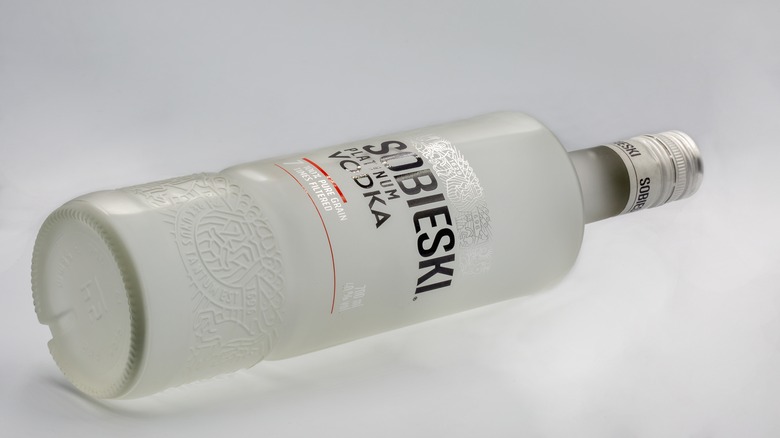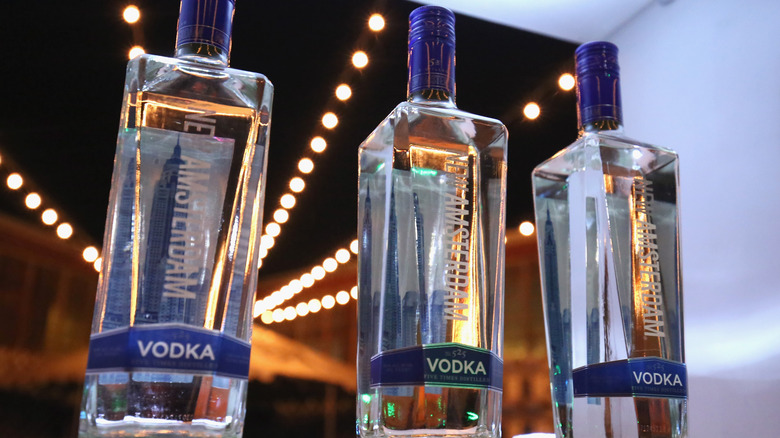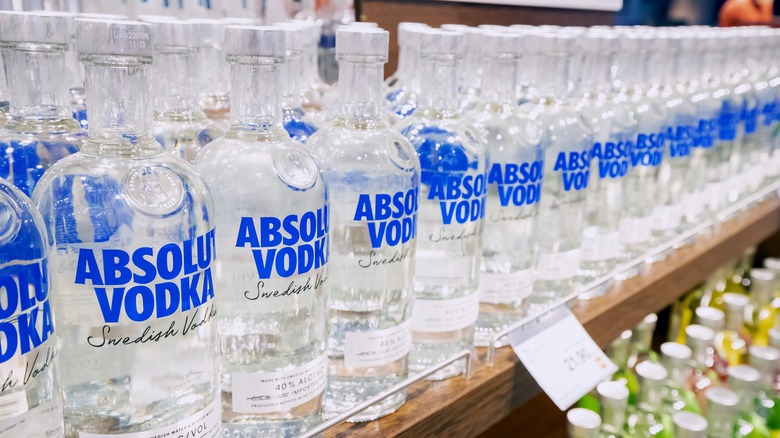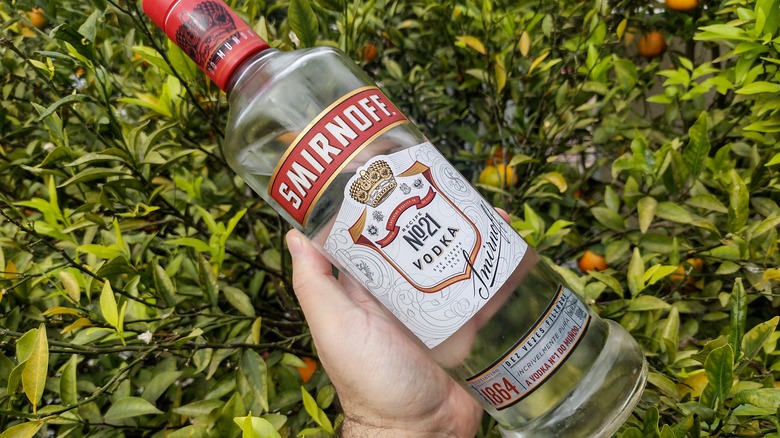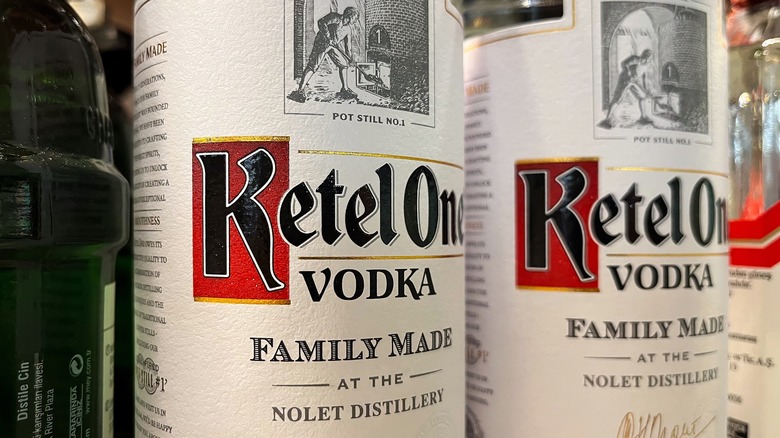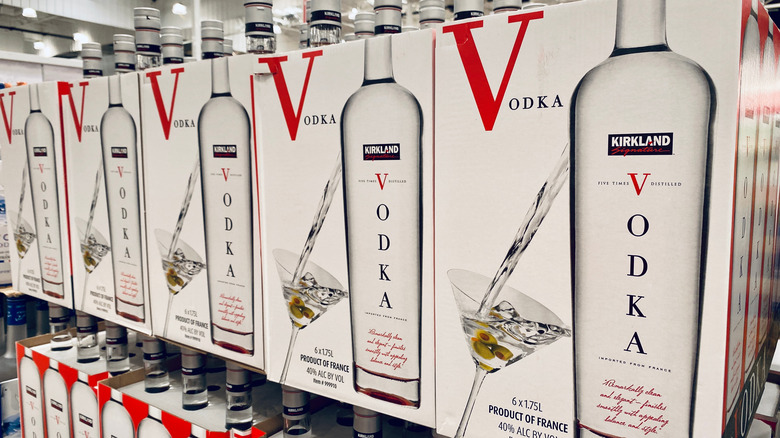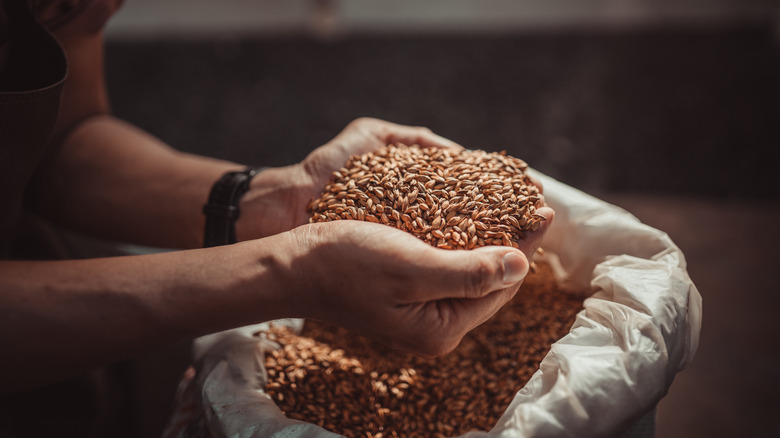10 Bottom Shelf Vodkas That Are Actually Worth The Buy, According To Experts
Vodka is perhaps the spirit with the least personality. It doesn't bring much by way of tasting notes to the table, but when you're looking for a clean, clear liquor to serve a boozy kick without dominating the flavor profile of your drink, vodka is what you want to reach for. Around the world, vodkas are made from grains, potatoes, sugar cane, and even maple sap. There are some pretty cheap ones on the market, leaving you wondering which of them are worth the buy?
Bottom shelf is a term that can come with some stigma, but here we use it to simply mean affordable. If you don't want to spend big bucks on fancy liquor, that doesn't mean you have to sacrifice quality. There's quite a spectrum on the bottom shelf, so we've spoken to some experts to get a sense of the best options at the low end of the price range. They all agree that vodka isn't something you need to spend a lot of money on.
Torrance Coombs is an experienced bartender in Los Angeles, California, who has worked everywhere from local dives to the swankiest private Hollywood events. He told Chowhound about the affordable vodkas he keeps in stock and why they're as good as the top-shelf alternatives. Jennie Wilson, co-owner of the celebrated 11th Mile restaurant in Fredericton, New Brunswick, Canada, is a longtime cocktail enthusiast who designs innovative craft cocktails for her restaurant. She and her bartender, Meg Messer, shared their favorite bottom shelf vodkas, plus a couple of comparable local favorites.
Tito's is a bartender's best friend
Jennie Wilson's No. 1 vodka for those who want to keep things affordable without sacrificing quality is Tito's. "Tito's is widely recognized as a perfectly drinkable vodka that you know you can still buy in a plastic jug," Wilson told Chowhound. "If you're going to buy a cheap liquor, make it a cheap vodka because vodka has sort of the least expression of any liquor. So, we're expecting much less out of vodka in terms of aromatics and depth of flavor." Torrance Coombs agrees. "It's the spirit you use when you specifically don't want the alcohol to bring anything to the table," he said.
Tito Beveridge started making his vodka in Austin, Texas in the early 1990s and Tito's Handmade Vodka grew to be known as one of the best vodkas in America. The way they tell it, it was an uphill battle to get his humble libations off the ground and onto store shelves, but Tito's became the first legal distillery in Texas, and eventually a bartender favorite to boot. With a name like Beveridge, how could he not be destined to succeed in this industry?
Svedka gets the party started
Svedka is another affordable American vodka with a fun party vibe, at least as far as its branding goes. According to the brand's website, "SVEDKA goes big. Goes crazy. Goes off. Goes everywhere." But experienced bartender Torrance Coombs says that vodka isn't really meant to be the star of the show when he's pouring out Svedka. "In my own personal bar ... I only buy bottom shelf vodka," he said. "Even as I spring for expensive spirits in other categories." This means vodka is really where you can afford to cut down on liquor costs.
Coombs does not deny that there are some exceptional high-end vodkas out there, but, as he explains, they are indistinguishable from bottom shelf options in many instances. "I've done vodka tastings in vodka rooms, and when you taste them side by side, you can taste a real difference. But as soon as you put [it] in a cocktail, I find it makes [little] difference if you're putting anything remotely delicious in along with it. Other flavors will just take over and that's really the vodka's purpose for me." So, when it comes to making cocktails, there's no point putting a pricier vodka in the mix. Coombs is grabbing Svedka from the bottom shelf.
Is it Stoli or Stolichnaya?
Back at 11th Mile, Jennie Wilson's star bartender, Meg Messer, joins our conversation. She's setting up for the evening dinner service and chimes in to admit that, while it may not be popular with cocktail snobs, she won't say no to a good lemon drop martini. And if she's making one at home, she's reaching for the Stoli. It's quadruple distilled for a super clean taste that allows the other flavors of the drink to shine.
This roundup started with two American brands, but you can't say vodka without thinking of Russia. Stolichnaya is a wheat- and rye-based vodka that originated in the Soviet Union in 1938. The brand split rather contentiously in 1997 into two separate entities: Stolichnaya, which is produced inside Russia for primarily Russian consumption; and "Stoli," made in Latvia by Stoli Group. In 2022, Stoli Group came out publicly against the invasion of Ukraine and even launched a special edition #LiberateUkraine bottle.
Today, Stoli proudly proclaims itself to be the "vodka of forward-moving cities," which the brand describes as being "rich cultural melting pots, and places of high diversity where different mindsets, ethnicities, and minorities co-exist." So, maybe it just tastes great, but if you're interested, even your vodka can have something to say about global politics.
Luksusowa is loyal to the humble potato
Sticking around Eastern Europe for a moment, Luksusowa is next on Jennie Wilson's and Meg Messer's lists. Not all vodkas are made from potatoes, but this one is. An award-winning vodka from Poland, Luksusowa first came on the scene in 1928. To this day it's produced in Poland using Polish potatoes. The brand markets itself as a premium vodka, and in fact, the name comes from the Polish word for "luxurious." But it's not hard to find a bottle of Luksusowa in the realm of $15 to $20. "I would keep that in my home," Wilson said. "I would serve that."
"I think in terms of bartending or mixology, you're gonna find there's not a lot of space given to vodka," Wilson said, reasoning that vodka's typical lack of distinct personality is precisely why mixologists tend not to favor the spirit. However, many classic cocktails do use vodka as their base, and some bartenders are eager to reinvent and reclaim these old favorites.
Cosmos, white and black Russians, Moscow mules, Bloody Marys, and espresso martinis are all vodka-based. "We did a drink with Luksusowa ... that was like a freshened Cosmo," Wilson said. "And you'll see a lot of bartenders looking back to those kind of old classics, and especially cocktails that maybe have fallen into disrepute or have a bit of a bad reputation at this point, and we're remaking them." And they're doing it with Luksusowa.
Sobieski keeps the Polish pride going
Also from Poland is Torrance Coombs' next pick: Sobieski. Distilled in Poland from 100% Polish rye and Polish spring water in traditional 40-meter columns, Sobieski is named for the Polish King Jan III Sobieski, aka The Lion of Poland. This 17th-century regent was famous for fighting off the Ottomans, among other things. There's even a constellation and a room in Vatican City named after this guy. Sobieski's bottles feature designs that tell his story. Sounds grand, doesn't it? But ultimately Sobieski is an affordable vodka that mixes well into anything, according to Coombs. If you're a negroni fan, try a negroski which swaps gin for Sobieski.
Sobieski makes both 37.5 proof and 40 proof clear vodka, sold in bottles as small as 50ml all the way up to 1750ml for those of us stocking up for the apocalypse ... or just a really big party. They also make a line of flavored vodkas, including their award-winning grapefruit flavor.
New Amsterdam is an old favorite
Rounding out Torrance Coombs' top three, New Amsterdam is another grain-based vodka made in California. According to the website, New Amsterdam vodka is five times distilled and three times filtered for award-winning soft and smooth vodka. The brand's 100 proof vodka features notes of citrus.
Just so we're all up on liquor lingo, "proof" refers to a beverage's ethanol content, and in the U.S. it's defined as twice the percentage of ABV. So 100 proof means this vodka is 50% alcohol by volume. That's on the higher end of commercial vodkas, which typically range from 75 to 100, with most landing around 80 proof (40% ABV).
New Amsterdam is the official vodka of UFC, and the brand is currently promoting a collab with the popular YouTube interview show Hot Ones, featuring a pepper-flavored vodka with habanero, fresno, and serrano notes. So, if you feel like adding a kick to your next vodka soda or Moscow Mule, give New Amsterdam a shot. And consider storing this cheap vodka in the freezer first. It won't actually freeze due to its high alcohol content, but it will get nice and cold and extra smooth.
Absolut is absolutely fine
Absolut is an internationally recognized Swedish brand launched in Åhus, Sweden in 1972. The brand uses Swedish winter wheat and well water in the production of its vodka, and its label also boasts carbon-neutral distillation (achieved by offsetting its carbon footprint with tree planting) and over 50% recycled glass in its bottles. If you're a Millennial, you may also recall Absolut's outrageous 2008 video promos made by the comedy duo Tim and Eric, starring Zach Galifianakis. Love to see a brand with a sense of humor as well as eco-consciousness.
Absolut, according to Jennie Wilson, is "perfectly drinkable." Particularly as her go-to spirit for "beach drinks" and anywhere drinks are cheap and the bartender is slinging them without finesse. "If the gals are hanging out on my patio, and I want to keep it fun and friendly, I'm gonna do a vodka and soda with a splash of cran," the restaurant owner said. "It's delicious and fresh."
Torrance Coombs also gives this brand's vodka high praise. "Absolut had a line of flavored vodkas for a while, based on cities," he said. "There was Absolut New Orleans, which was a mango, black pepper flavored vodka. And I was [initially] collecting them for the bottles ... but that ended up being delicious. I kept that in the freezer and I sipped that for months."
Smirnoff puts the icing on the cake
Smirnoff is another must-know brand you can find just about anywhere. It claims to be "the number one best-selling premium vodka in the world." Sold in more than 130 countries today, the brand was started by P.A. Smirnov in 1864 and rebranded as Smirnoff after the Russian Revolution. The brand is famous for its vodka coolers, such as Smirnoff Ice, a citrusy carbonated drink that got a bump in popularity in 2010 from the internet trend referred to as "icing." This is a prank where someone hides a Smirnoff Ice and whoever finds it must get down on one knee to chug the whole bottle in one go. That sounds great for Smirnoff's business, but maybe not so great for hangovers.
This is where we lost Jennie Wilson and Meg Messer, who are anti-flavored vodka. They see them as "a headache in a glass." On the other hand, Torrance Coombs praised an aforementioned flavored vodka as his favorite for sipping slowly. Maybe he has more restraint than others, or it's just up to personal taste.
Most major labels offer flavored options to try. Flavored or not, though, Wilson and Messer agree Smirnoff isn't on their personal shopping lists. However, Wirecutter, by The New York Times, places it among their best vodkas in 2024, calling it "crisp, clean, and versatile." So you'll just have to taste some and decide for yourself.
Ketel One keeps it classic
So, what happens when you're not mixing vodka with juice or soda, but you still don't want to spend a lot of money on a bottle? Jennie Wilson and Meg Messer think it's well worth keeping Ketel One in stock. 11th Mile specializes in creative craft cocktails, but if someone asks for a vodka martini they'll be happy to serve one up. In that case, Messer tells us, Ketel One is their vodka of choice.
Martinis are made by mixing vodka (or gin, if you prefer) with a little vermouth and that's about it. And although you can upgrade martinis in many ways — wet or dry, shaken or stirred, with a twist of lemon or dirty with an olive — martinis are typically as close to straight-up booze as a cocktail gets. So when it comes to a classic martini, you can't afford to pick a sub-par liquor because there's nothing for it to hide behind. Messer picking Ketel One is surely an endorsement of its clean and smooth taste.
Made in the Netherlands, Ketel One originated in 1983 from the 10th generation of the Nolet family who have been running a distillery in Schiedam, Holland since 1691. The image of their family seal is on every bottle. The distillery gets its name from the traditional copper pot, "Distilleerketel No. 1," which it still uses to produce its vodka.
Some rumors are true about Kirkland Signature vodka
Word on the street is that Costco's Kirkland Signature brand vodka is actually pretty good. Torrance Coombs assures us that it is, in fact, pretty much as good as any other bottom shelf vodka, and may even pass for top-shelf. "If you were to hand somebody a vodka soda made with Kirkland, and they'd specifically requested Grey Goose or Tito's or something, I think they'd be hard-pressed to notice you'd swapped it out for them," he said, referring specifically to Kirkland's French vodka.
In fact, rumors were swirling around about what company produces Kirkland's vodka, and some fervently believed it was Grey Goose. The company denied this — there was even a page on its website dispelling the theory — but this speaks to the quality of Kirkland's vodka.
Want to put Coombs' sneaky swap to the test yourself? Time to bust out that membership card! Consider reviewing other bargain liquors to buy at Costco before you go.
Unique local options can be good alternatives to bottom shelf vodka
For those times when you want an affordable vodka but also want to shop small, consider a local brand to add to your bar's stock. You can make a fun road trip to a micro-distillery near you (there might even be one right in your city) or order online from these smaller operations. If you can spend the same amount of money as you would for bottom shelf vodka and support a small business, why wouldn't you? You'll probably end up with something really good, and at the very least it will make your bar cart more unique!
11th Mile celebrates local ingredients whenever possible. That ethos extends to the bar, where Jennie Wilson makes a point of keeping Blue Lobster vodka from Nova Scotia Spirit Co. and Vieille Bagosse vodka from Distillerie Fils Du Roy in stock. Both of these are local operations with internationally awarded products.
Fils du Roy was started by mother-son team Sébastien and Diane Roy in 2012 right in New Brunswick. The micro-distillery's spirits have garnered international recognition and have even been the subject of a glowing Forbes article. Wilson loves Vieille Bagosse not only because it's local, but also because it's unique. The vodka is aged in whiskey barrels for added flavor. Meanwhile, Blue Lobster is the "cheap and cheerful" local option that's perfect for mixed drinks.
